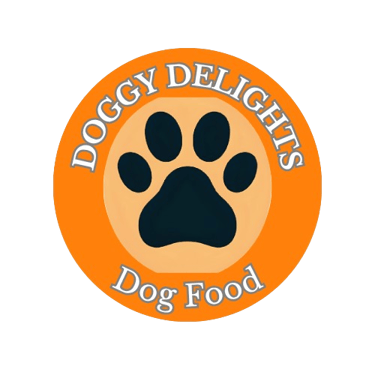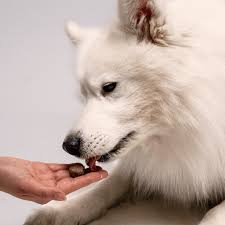Premium Grain-Free Dog Food for Optimal Canine Health


Wysong Epigen stands out as a protein-dense dry food produced by a family-owned U.S. business. This formula derives its protein primarily from organic chicken, chicken meal, and turkey meal, with meat meal offering nearly 300% more protein than fresh meat. The recipe boasts an impressive 67% protein content, making it an excellent choice for dogs requiring a high-protein diet. Wysong Epigen is made in the United States and features a significant amount of named meats, ensuring quality and transparency in its ingredients. This grain-free option is ideal for adult dogs seeking a protein-rich, nutrient-dense meal
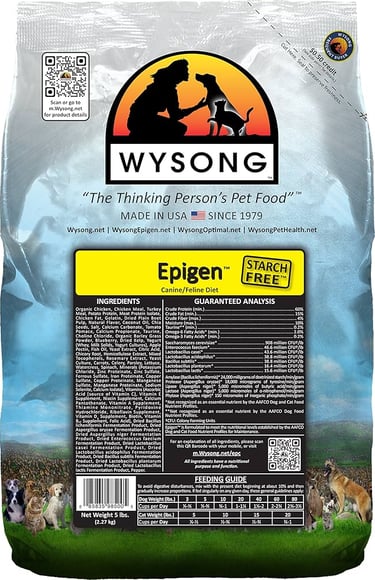


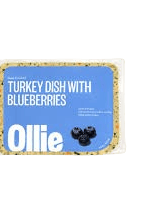
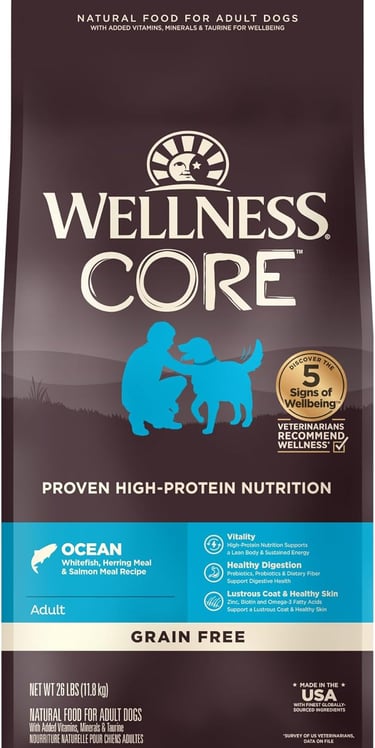

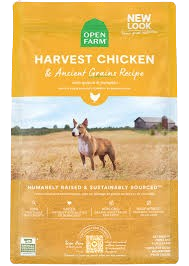

New Reviews & updates
Leading Dog Foods
Leading Dog Food for Diabetes
Leading Dog Foods for Sensitive Stomachs
Leading Dog Food for Allergies
Leading Dog food for specific Breeds
Open Farm Harvest Chicken
Home > Leading Dog Food > Leading Grain Free Dog Foods
Amazon Associate
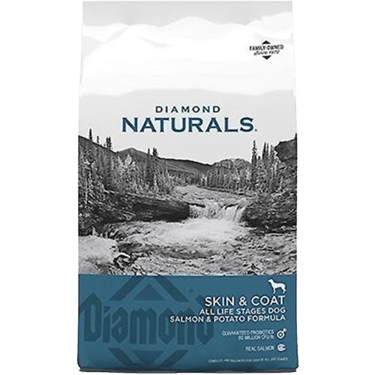

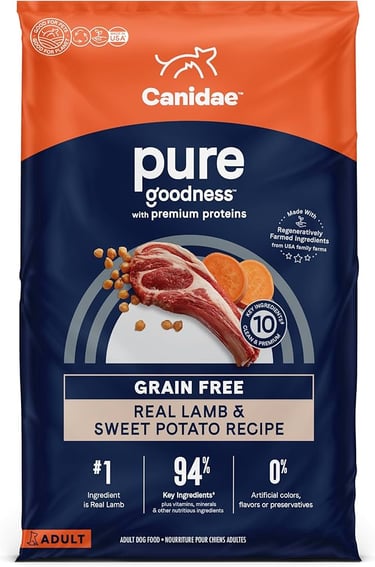

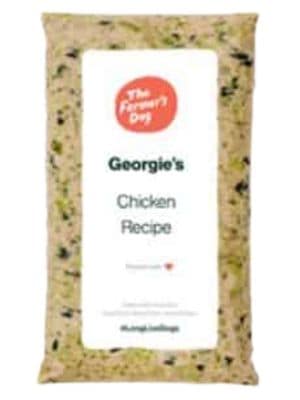

Open Farm Harvest Chicken stands out for its commitment to using human-grade and ethically sourced ingredients. This high-protein, low-carb formula is particularly suitable for older dogs, helping maintain muscle mass and boost the immune system. The recipe features non-GMO vegetables like sweet potatoes, carrots, and spinach, ensuring a nutrient-packed meal. Open Farm's transparency is noteworthy, with 100% traceable ingredients. The Harvest Chicken recipe derives its protein primarily from chicken, making it a simple yet nutritious choice for dogs who thrive on poultry-based diets. This grain-free option is an excellent choice for pet owners prioritizing ethical sourcing and ingredient quality1.
Canidae Grain-Free Pure Real Lamb and Sweet Potato is an excellent choice for dogs with allergies to common proteins. Lamb, being a more novel meat source, serves as the primary protein in this recipe. The limited ingredient formula is free from artificial colors, flavors, and preservatives, making it suitable for dogs with sensitive stomachs or food sensitivities. Canidae's commitment to quality is evident in their use of named meat sources and their diverse range of recipes. While formulated for adult dogs, this grain-free option provides a balanced, nutritious meal that caters to dogs requiring alternative protein sources.Write your text here...
Amazon Associate
Canidae Grain-Free Pure Real Lamb and Sweet Potato
Write Diamond Naturals Skin and Coat formula offers a budget-friendly, grain-free option suitable for dogs at all life stages. With salmon as the first ingredient, this recipe provides ample omega fatty acids to support immune system function and promote healthy skin and coat. The formula also includes nutrient-rich vegetables and superfoods like lentils, enhancing its nutritional profile. Despite its affordability, Diamond Naturals doesn't compromise on quality, offering a balanced diet free from artificial colors, flavors, and preservatives. This grain-free option is an excellent choice for pet owners seeking quality nutrition at a more accessible price point.
Amazon Associate
Diamond Naturals Skin and Coat
The Farmer's Dog Chicken Recipe offers a fresh, human-grade approach to grain-free dog food. This highly palatable formula is particularly beneficial for puppies and dogs with digestion issues. The recipe is protein-rich, using fresh chicken as its primary protein source. The Farmer's Dog customizes portions based on your dog's specific needs, ensuring optimal nutrition. While it may be pricier than some alternatives, the exceptional quality of ingredients and the convenience of delivered fresh food make it a top choice for pet owners seeking the best for their dogs. This grain-free option provides a near-homemade quality without the hassle of preparation.
Tender and True Salmon and Sweet Potato is a grain-free option tailored for small breeds. The kibble size and texture are specifically crafted to suit smaller mouths, making it easier for little dogs to eat and digest. This recipe is rich in omega-3 fatty acids, which help boost the immune system and ease joint pain. The primary protein sources are salmon and whiting meal, while sweet potato provides dietary fiber, vitamins, and minerals. With its balanced nutrient profile and focus on small breed needs, Tender and True Salmon and Sweet Potato offers a high-quality, grain-free option for smaller dogs
Amazon Associate
Tender and True Salmon and Sweet Potato
Wellness Core Ocean Formula is specifically designed for large breed dogs, offering a grain-free option that supports their unique nutritional needs. This dry food recipe is rich in protein, primarily sourced from fish and fish meal, making it an excellent choice for dogs with sensitivities to common meat proteins. The formula is free from corn, wheat, soy, and gluten, focusing instead on whole-body health without any meat by-products or artificial preservatives. With its high protein content and carefully selected ingredients, Wellness Core Ocean Formula provides large breed dogs with the nutrients they need to maintain their size and support joint health.
Amazon Associate
Wellness Core Ocean For
Ollie Fresh Turkey offers a personalized approach to grain-free dog nutrition. This wet food formula sources its protein mainly from fresh turkey and turkey organ meat, providing a well-rounded amino acid profile. Ollie customizes feeding plans based on your dog's specific needs, considering factors like age, weight, and activity level. The meals are delivered fresh, stored in your freezer, and thawed as needed, offering a near-homemade experience without the hassle. While it may not be the most budget-friendly option, Ollie Fresh Turkey's human-grade ingredients and tailored approach make it a top choice for pet owners seeking premium, grain-free nutrition.
These 8 grain-free dog foods were selected for their high-quality protein sources, balanced nutrition, and specialized formulas catering to various canine needs. They offer a range of options from dry kibble to fresh meals, addressing different preferences and dietary requirements. These brands prioritize wholesome ingredients, avoid common allergens, and provide essential nutrients without grains, making them suitable for dogs with sensitivities or those requiring grain-free diets.
Top 8 Grain-Free Dog Foods
Amazon Associate
Wysong Epigen
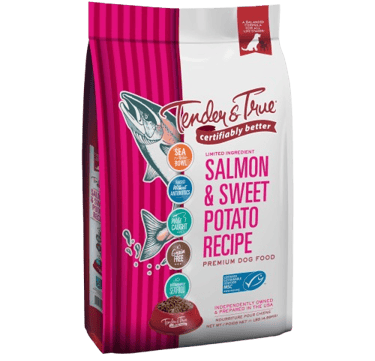

Get the Best Deals
Free Dog Food Alerts
How to Choose the Correct Dog Food
Related Articles:
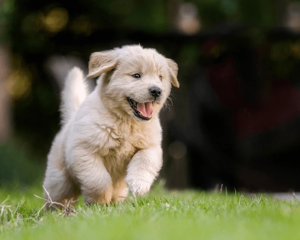



The most concerning risk is the potential link between grain-free diets and canine dilated cardiomyopathy (DCM), a serious heart condition. The FDA has been investigating this connection since 2018, with over 500 reported cases of DCM in dogs eating grain-free diets.
DCM: causes enlargement of the heart, hindering its ability to pump blood effectively. Symptoms include easy tiring, coughing, and difficulty breathing. This condition has been observed in dog breeds not typically predisposed to DCM, suggesting a dietary link.
Other risks of grain-free diets include:
1. Nutritional imbalances: Grain-free foods often use alternative carbohydrates like potatoes and tapioca, which may provide less fiber and essential nutrients compared to grains.
2. Potential for weight gain: Some grain-free alternatives have higher sugar content, which could lead to weight issues.
3. Taurine deficiency: Although not consistently observed across all studies, some dogs on grain-free diets may develop a taurine deficiency, contributing to heart problems.
4. Gastrointestinal issues: The lower fiber content in some grain-free diets may lead to digestive problems.
It's important to note that despite marketing claims, grain allergies in dogs are rare. Most food allergies in dogs are related to animal proteins rather than grains]. Pet owners should consult with their veterinarians before choosing a grain-free diet for their dogs, especially given the potential cardiac risks associated with these foods.
1. Are there any risks associated with feeding grain-free dog food to puppies?
Yes, there are significant risks associated with grain-free dog food.
2. How do veterinarians typically recommend grain-free diets for dogs?
There are a few specific situations where a veterinarian might recommend a grain-free diet:
Veterinarians typically do not recommend grain-free diets for dogs unless there are specific medical reasons to do so. In fact, grain-free diets have been linked to an increased risk of dilated cardiomyopathy (DCM), a serious heart condition in dogs.
1. Food allergies: If a dog has a confirmed grain allergy, which is rare (affecting fewer than 1% of dogs), a grain-free diet may be necessary.
2. Digestive issues: For dogs with stomach sensitivities or digestive problems, a vet might recommend an elimination diet or limited ingredient diet, which may be grain-free, to identify and manage the issue.
3. Specific medical conditions: Some rare conditions, such as epileptoid cramping syndrome in Border Terriers, may respond to a gluten-free (and consequently grain-free) diet.
When a grain-free diet is deemed necessary, veterinarians typically recommend prescription hypoallergenic diets that have undergone rigorous testing and feeding trials. These diets are formulated to meet all nutritional requirements while addressing specific health concerns.
It's important to note that most dogs do not require grain-free diets, and grains can provide beneficial fiber, vitamins, and minerals Veterinarians generally advise against grain-free diets for healthy dogs due to the potential health risks and lack of proven benefits. If pet owners have concerns about their dog's diet, they should consult with their veterinarian for personalized advice based on their dog's specific health needs.


3. What are the most common ingredients found in grain-free dog foods?
Grain-free dog foods typically contain the following common ingredients:
1. High-quality protein sources: These often include chicken, duck, salmon, trout, turkey, beef, and eggs. Check out this guide for grain-free dog foods.
2. Vegetables: Sweet potatoes, peas, and carrots are frequently used as carbohydrate sources in grain-free dog foods.
3. Legumes: Peas, lentils, and beans are common ingredients in grain-free formulations, although their use has been subject to some controversy.
4. Potatoes: Both white and sweet potatoes are used as alternative carbohydrate sources.
5. Fruits: Some grain-free dog foods incorporate fruits like apples, blueberries, and cranberries for added nutrients and natural sugars.
6. Seeds and other plant-based ingredients: Flaxseed is sometimes included in grain-free recipes.
7. Vitamins and minerals: These are added to ensure the food is nutritionally complete and balanced.
It's important to note that while these ingredients are common in grain-free dog foods, the quality and proportions can vary significantly between brands. Some high-quality grain-free options prioritize meat content, with up to 90% of the recipe consisting of animal-based proteins. It's important to be aware of what you are feeding you dog.
4. What are the benefits of grain-free dog food for dogs with sensitive stomachs?
Grain-free dog food offers several benefits for dogs with sensitive stomachs:
Improved Digestion:
Grain-free dog food can be easier for dogs with sensitive stomachs to digest. Many dogs find grains like wheat, corn, and soy difficult to process, which can lead to digestive issues. By eliminating these grains, grain-free food reduces the risk of bloating, gas, and other digestive problems.
Reduced Allergic Reactions:
For dogs with grain allergies or sensitivities, switching to grain-free food can provide significant relief[4]. Grain allergies can cause symptoms such as itching, skin irritation, and digestive upset. Removing grains from the diet can help alleviate these issues.
Higher Protein Content:
Many grain-free dog foods have a higher protein content, which can be beneficial for dogs with sensitive stomachs. This increased protein can help dogs feel fuller for longer and may support better muscle maintenance.
Alternative Carbohydrates:
Grain-free foods typically use alternative carbohydrate sources like sweet potatoes, lentils, or quinoa[1][6]. These ingredients are often more easily digestible for dogs with sensitive stomachs and can provide necessary energy and nutrients without causing digestive distress.
Potential for Weight Management
Some grain-free diets may help with weight management, which can be beneficial for overweight dogs with sensitive stomachs[5]. However, it's important to note that some grain-free foods may actually have higher carbohydrate content, so careful selection is necessary.
While grain-free dog food can offer these benefits, it's crucial to consult with a veterinarian before making any significant changes to your dog's diet, especially if they have a sensitive stomach or other health concerns[6].


5. How do I know if my dog needs a grain-free diet?
There are several signs that may indicate your dog could benefit from a grain-free diet:
1. Digestive issues: If your dog experiences frequent gas, bloating, or diarrhea after eating foods containing grains, it may be a sign that their digestive system is struggling to process them.
2. Skin problems: Itchy skin, rashes, or excessive scratching could be symptoms of grain allergies or sensitivities.
3. Ear infections: Chronic ear infections may be a sign of food allergies, including grain sensitivities.
4. Low energy: If your dog seems unusually lethargic, it could be due to digestive discomfort caused by grains.
5. Weight management issues: Difficulty maintaining a healthy weight might be related to grain consumption in their diet.
However, it's important to note that true grain allergies are rare in dogs, affecting less than 1% of the population. Additionally, recent studies have linked grain-free diets to an increased risk of heart disease in dogs[4]. Therefore, before switching to a grain-free diet, it's crucial to consult with your veterinarian. They can perform proper allergy testing and provide personalized advice based on your dog's specific health needs.
If your dog does require a grain-free diet for medical reasons, your vet can recommend appropriate foods and monitor your pet for any potential heart issues. Remember, for most dogs, a balanced diet that includes whole grains can be beneficial, providing essential nutrients, fiber, and energy.
Grain free dog foods are generally good for dogs but each dog is different and the best way to know is to consult your vet. There are those vets who advocate for grain-free dog foods and there are those who don't. So,it's up to you to make an informed decision if grain-free dog food is right for your dog.
